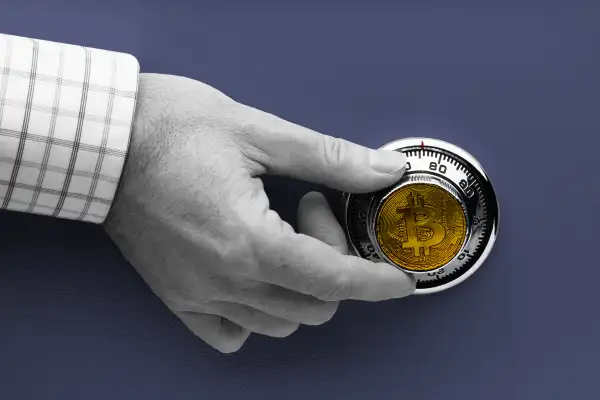Why Crypto Assets Aren’t Protected by the FDIC Like Bank Deposits
Money is not a client of any investment adviser featured on this page. The information provided on this page is for educational purposes only and is not intended as investment advice. Money does not offer advisory services.

After a dramatic selloff that wiped hundreds of billions of dollars off the crypto market in a matter of days, investors are learning the hard way that there are few guardrails in place when it comes to digital assets.
As Bitcoin nosedived more than 50% from its highs last fall, and TerraUSD and Luna — tokens that were pegged to the value of the U.S. dollar — collapsed to nearly zero, some investors panicked. Many sold their holdings, and prices dropped even further. The result was a crypto crash of historic proportions.
On social media, crypto investors lamented their enormous losses. Some even called for compensation from the creator of Luna. And that same week, a line buried in an annual report from crypto exchange Coinbase warned that users could lose all the crypto holdings in their accounts if the exchange went bankrupt. (In a blog post, Coinbase reassured its customers that the "business is healthy" and their "funds are safe.")
The bad news for crypto investors is that investments in digital tokens are not protected or regulated by any kind of government body. Crypto is an incredibly volatile investment, and there’s nothing to fall back on when the price craters.
Does the FDIC cover crypto?
Crypto differs from cash in a lot of ways, but one major distinction is that liquid assets kept in banks enjoy more protections in the event that those institutions fail. Consumers have peace of mind thanks to a government agency called the Federal Deposit Insurance Corporation, or FDIC.
The FDIC was founded during the Great Depression, when thousands of banks shut down due to the widespread panic that ensued when depositors across the country tied to withdraw their money en masse, only to find out the U.S. banking system did not have adequate cash reserves to weather the crisis.
If a bank failed in the years before the FDIC, there was a good chance customers would lose all their money. However, since the agency began providing deposit insurance in 1934, “no depositor has lost a single penny of insured funds due to bank failure,” according to its website.
Today, the FDIC backs more than 4,000 banks. It will insure $250,000 per depositor, per insured bank, per account category. The coverage is baked in — if your bank is FDIC-insured, you have coverage.
If your bank goes under, the government guarantees you'll get your money — up to $250,000 — back. It’s possible to increase your coverage by holding multiple different types of accounts or by holding accounts at multiple banks. Jointly held accounts can also qualify for more coverage.
However, the FDIC only insures certain types of deposits. Those include money in checking accounts, savings accounts, money market deposit accounts, certificates of deposit and a few others. The agency doesn’t insure investment assets like stocks, bonds, annuities, U.S. Treasury bills or cryptocurrency.
“When you're investing in stocks or crypto, you are taking risks that you may lose everything,” says Richard Smith, chairman and chief executive of the Foundation for the Study of Cycles, a nonprofit that studies recurring patterns in the economy, science and the arts. “There's no one to make sure that your losses are never above a certain level.”
Do crypto exchanges have insurance?
Crypto exchanges like Coinbase hold cash in custodial accounts at FDIC-insured banks, meaning that cash held in accounts does qualify for deposit insurance. But crypto holdings do not. And unlike the biggest stock exchanges, which conduct extensive due diligence and have strict standards that companies must meet before they are allowed to list publicly, cryptocurrency offerings are “literally the Wild West,” Smith says. “Anybody can make a cryptocurrency easily.”
Coinbase is transparent about the risk. "Cryptocurrency is not legal tender and is not backed by the government," one of its help pages reads, adding that crypto is also not subject to FDIC protections. Kraken, another crypto exchange, makes a similar disclosure. "Cryptocurrency exchanges do not qualify for deposit insurance programs because exchanges are not savings institutions," it tells its customers.
That lack of regulation and oversight is one of the biggest draws of crypto for many people, but it’s also the source of much of the risk associated with investing in digital assets. Last week’s Luna meltdown “tells you that nothing is really immune from the risk of total disaster,” says Smith. He says investors may be able to report "outright fraud," but he cautions that the likelihood of recovering any losses is still "pretty much nothing."
The FDIC is already taking steps to prevent crypto traders from being misled by false claims about deposit insurance. Along with the Consumer Financial Protection Bureau (CFPB), it issued a clear warning Tuesday for companies: Don't misuse the FDIC's name or logo, and don't make false claims about FDIC insurance coverage if your customers aren't eligible.
"Such misrepresentations also harm consumers, who may find that their assets are not insured in a time of financial distress," Tuesday's CFPB announcement reads.
The warning is a good reminder for crypto investors and exchanges, but it doesn't eliminate any of what the CFPB called "particularly acute risks" that are inherent to digital assets. During a recent congressional hearing, Treasury Secretary Janet Yellen described last week's crypto meltdown as a “real-life demonstration” of the dangers associated with cryptocurrencies.
“We really need a regulatory framework to guard against the risks,” she told lawmakers.
More from Money:
Bitcoin's Price Is Down More Than 50% From Its High. Is Now a Good Time to Buy?
